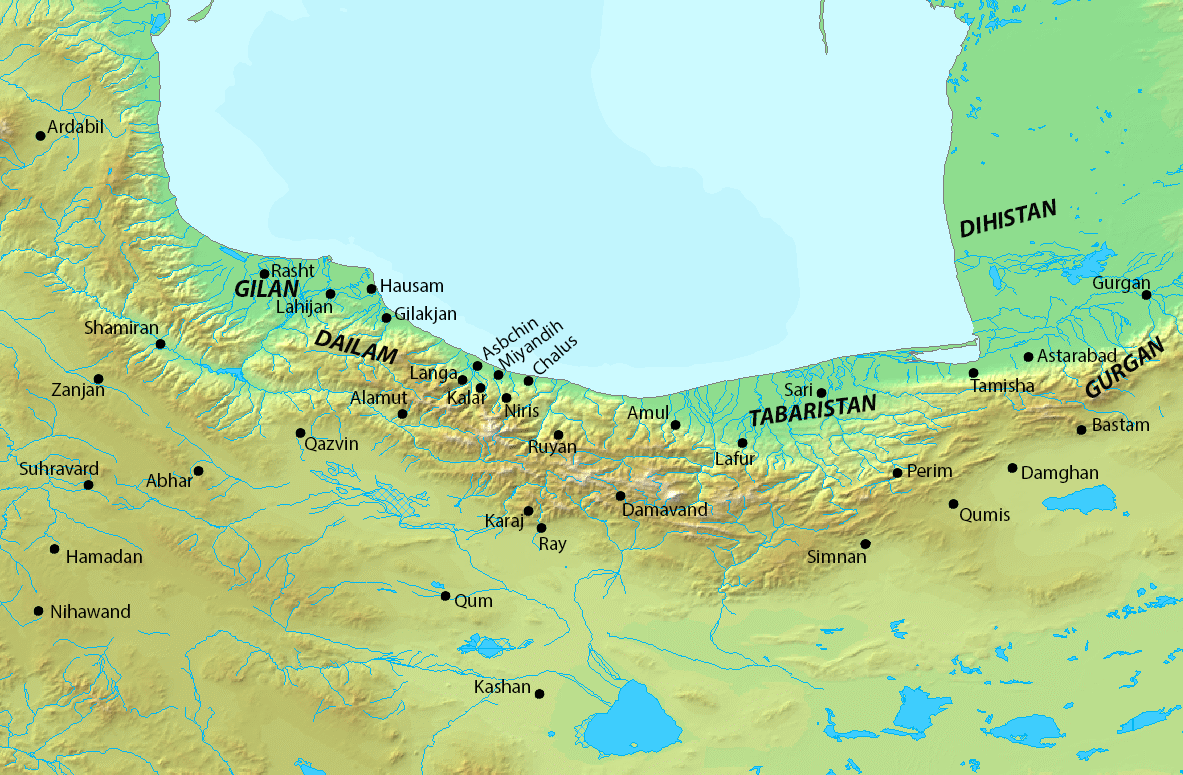Adhar Valash on:
[Wikipedia]
[Google]
[Amazon]
 Adhar Valash was an
Adhar Valash was an
 Adhar Valash was an
Adhar Valash was an Iranian
Iranian may refer to:
* Iran, a sovereign state
* Iranian peoples, the speakers of the Iranian languages. The term Iranic peoples is also used for this term to distinguish the pan ethnic term from Iranian, used for the people of Iran
* Iranian lan ...
prince from the House of Karen
House of Karen (Middle Persian: ''Kārēn'', Parthian: ''𐭊𐭓𐭍𐭉 Kārēn,'' fa, کارن ''Kārin'' or ''Kāren''), also known as Karen-Pahlav (''Kārēn-Pahlaw'') was one of the Seven Great Houses of Iran during the rule of Parthian an ...
, who ruled Tabaristan
Tabaristan or Tabarestan ( fa, طبرستان, Ṭabarestān, or mzn, تبرستون, Tabarestun, ultimately from Middle Persian: , ''Tapur(i)stān''), was the name applied to a mountainous region located on the Caspian coast of northern Iran. ...
and Gurgan
Gorgan ( fa, گرگان ; also Romanization of Persian, romanized as ''Gorgān'', ''Gurgān'', and ''Gurgan''), formerly Esterabad ( ; also romanized as ''Astarābād'', ''Asterabad'', and ''Esterābād''), is the capital city of Golestan Provi ...
under the authority of the last Sasanian
The Sasanian () or Sassanid Empire, officially known as the Empire of Iranians (, ) and also referred to by historians as the Neo-Persian Empire, was the last Iranian empire before the early Muslim conquests of the 7th-8th centuries AD. Named ...
emperor Yazdegerd III
Yazdegerd III (also spelled Yazdgerd III and Yazdgird III; pal, 𐭩𐭦𐭣𐭪𐭥𐭲𐭩) was the last Sasanian King of Kings of Iran from 632 to 651. His father was Shahriyar and his grandfather was Khosrow II.
Ascending the throne at t ...
().
The name of ''Adhar Valash'' is a combination of ''ādur/ādar'' ("fire") and the personal name of ''Walāxš'' (also spelled ''Walākhsh''). A descendant of the prominent 6th-century statesman Bozorgmehr
Bozorgmehr-e Bokhtagan (Middle Persian: ''Wuzurgmihr ī Bōkhtagān''), also known as Burzmihr, Dadmihr and Dadburzmihr, was an Iranian sage and dignitary from the Karen family, who served as minister ('' wuzurg framadār'') of the Sasanian king ...
, Adhar Valash had been given control over the provinces during the Arab conquest of Iran
The Muslim conquest of Persia, also known as the Arab conquest of Iran, was carried out by the Rashidun Caliphate from 633 to 654 AD and led to the fall of the Sasanian Empire as well as the eventual decline of the Zoroastrian religion.
The ...
. Not long after, his domain was threatened by the Gil Gavbara
Gil Gavbara ( fa, گیل گاوباره), also known as Gavbarih (the Cow Devotee), was king and founder of the Dabuyid dynasty in 642, ruling until his death in 660.
Origins
According to Ibn Isfandiyar, the Dabuyids were descended from Djamasp, a ...
, a great-grandson of the 5th-century Sasanian ruler Jamasp
Jamasp (also spelled Zamasp or Djamasp; pal, 𐭩𐭠𐭬𐭠𐭮𐭯; fa, جاماسپ ''Jāmāsp'') was Sasanian King of Kings of Iran from 496 to 498/9. He was a son of Peroz I and younger brother of Kavad I. Jamasp was installed on the Sasan ...
(). Adhar Valash requested the aid of Yazdegerd III, who, however, after being informed of Gil Gavbara's Sasanian descent, ordered Adhar Valash to submit to the latter. Some time afterwards, Adhar Valash died during a game of polo
Polo is a ball game played on horseback, a traditional field sport and one of the world's oldest known team sports. The game is played by two opposing teams with the objective of scoring using a long-handled wooden mallet to hit a small hard ...
after falling from his horse. A grandson of Adhar Valash, also named Valash Valash (Middle Persian: ''Wardākhsh/Walākhsh'', fa, بلاش), was an Iranian prince from the House of Karen, who later became the ruler of Tabaristan in 665.
He was the grandson of the nobleman Adhar Valash, and thus a descendant of Sukhra, a ...
, ruled Tabaristan from 665 to 673.
References
Sources
* * {{cite book , last = Ibn Isfandiyar , first = Muhammad ibn al-Hasan , author-link = Ibn Isfandiyar , title = An Abridged Translation of the History of Tabaristan, Compiled About A.H. 613 (A.D. 1216). , others = Trans. Edward G. Browne. , publisher = E.J. Brill , location = Leyden , year = 1905 , url = https://books.google.com/books?id=HhNgAAAAMAAJ House of Karen 7th-century Iranian people 7th-century deaths Year of birth unknown